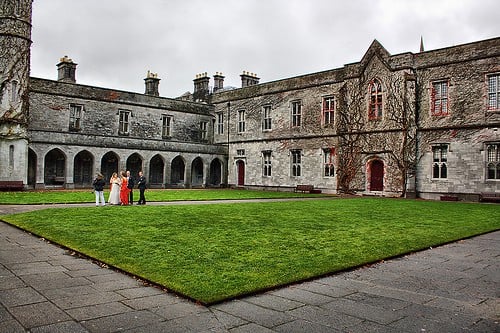So, you're curious about how to study abroad in Ireland. Well, you certainly have good taste! It's safe to say Ireland is most known for its beautiful green hills and green fields, and some even call it the Emerald Isle. It has a rich history and an abundance of cultural differences you'll find interesting to learn more about.
While you're learning more about Irish culture and Irish history, you'll be meeting other international students, Irish students, and friendly, local Irish people. Extraordinary experiences are waiting for those who choose to study abroad in Ireland.

You might be wondering, okay, I know I want to do this, but where do I start?
I've compiled a handy 'study abroad Ireland' go-to guide that I hope helps get you started!
This guide is primarily for those looking at studying in the Republic of Ireland as opposed to Northern Ireland.
Table of Contents
- Start With Research And Finding the Right Program To Study Abroad
- How Much Does It Cost?
- How Do I Convince My Parents?
- Which Part of Ireland Should I Go To?
- When Should I Apply?
- What Will I Need To Prepare?
- What Do I Need To Bring?
- Where Will I Stay?
- Will I Make Friends?
- Will My Phone Work There?
- I'm in Ireland. Now What?
- Other Important Need-To-Know Information
Start With Research And Finding the Right Program To Study Abroad
Your current school might have specific traveling abroad programs, so it's best to start looking there. Or maybe you've already looked into it and realized they don't have an Ireland-specific program. That's okay; it's still entirely possible to study abroad in Ireland!
As simple as it seems, just Google "Studying Abroad in Ireland," and you will be advertised several experienced programs set up for those interested in exploring Ireland, learning more about Irish culture, and more!
How Much Does It Cost?
Let's talk about program costs: Every program will have a program fee, whether you go through your school or through a third-party program. Those prices can vary.
Often, going through your school's program is more cost-effective and affordable. Sometimes, even applying directly to an Irish college is better. However, other programs outside of going straight through a school can run up to $16,000.

Here are specific prices shared from gooverseas.com (these are for the academic year 2020-2021, as noted):
Tuition for a Semester Studying Abroad in Ireland:
Trinity College Dublin: $9,915 - $13,145 depending on the area of study (2020-2021)
Maynooth University: $7,905 - $8,785 depending on the scope of study (2020-2021)
University College Dublin: $5,770 - $32,210 depending on the topic of study (2020-2021)
University College Cork: $7,320 - $28,550 depending on the field of study (2020-2021)
Tuition for a Semester of Study Abroad through a Third-Party Provider:
USAC Cork: $14,810 (2020-2021)
API Galway: $17,280 (2020-2021)
CEA Study in Dublin: $5,195 - $7,795 for a semester or summer term (2020-2021)
CISAbroad Limerick: $15,990 (2020-2021)
Some programs might provide financial aid, and if you can get that, that would be wonderful—but unfortunately, I wouldn't depend on this. Even if you were granted financial aid, it doesn't necessarily mean it would cover all your expenses, and it just might mean it offers you a nice, compelling discount.

The fees you may have to account for are as follows:
- Program fees: Sometimes, this includes both travel and class fees
- Class fees
- Travel fees
- Housing fees
- Meal plans
Personal costs to consider:
- Preparing to leave and stocking up on toiletries, one of those plane pillows, etc.
- In-flight entertainment: It's a long plane ride to Ireland, so you're going to want to bring some reading material or watch a movie or two on the flight to pass a couple of hours.
- Fun money for shopping, dining out, public transit, or weekend excursions.
- Savings! You've just got to have that pocket of money set aside in case of emergencies. I can't tell you what those emergencies are, and I genuinely hope there are none, but having extra funds is essential. It's best to plan for all contingencies.
All in all, it's going to cost a few thousand dollars to go at the very least. Some people save for a year or two before making the significant investment, and it's definitely very much worth it!
How Do I Convince My Parents?
Some of you, maybe not all of you, may need to ask for your parents' or guardian's permission before traveling abroad. Whether this is because they are the ones who would help you financially or simply because you respect their opinion, it's always best to come to the conversation prepared.
If this should be your first trip away from home, especially without family and alone, you may feel a little concerned. Family remaining in America can also be worried, and t's natural for people who love you to get a little nervous sometimes.
To help ease these anxieties, you can come to the conversation with facts that can help assure them you are prepared, have planned, and thought everything through. For example, knowing where you want to go, why, which program, and how much it costs.
Your loved one likely already knows this, but it can't hurt to remind them that the experience of traveling abroad is priceless. Experiencing life in another country and learning about new cultures only further deepens your education in a way that sitting in a classroom here in the United States simply can't.
Traveling can genuinely provide a higher education than most formal ones because it offers you lived experiences that can be much more impactful.
Also, fun fact: Did you know Northern Ireland has the second-lowest crime rate in Europe? This will surely help ease concerned family or friends worried about you traveling alone.
And, technically, you won't be alone at all. There will be a program director you can turn to for guidance, and you will make new friends in the same program!

Which Part of Ireland Should I Go To?
The capital city of Dublin is always one of the most popular destinations, especially for Americans. There is plenty of local culture throughout the famous city of Dublin with tons of restaurants and shopping. Lots of history and places to visit in Ireland's capital city.
Dublin is home to many universites including Trinity College, University College Dublin (UCD) and Dublin City University (DCU). They all offer undergraduate and graduate programs.
Other locations includ the city of Galway which is home to University College Galway (UCG).
Cork is home to University College Cork (UCC).
Maynooth lies just north west of Dublin City in County Kildare and is home to the Maynooth University.
Limerick is home to the University of Limerick, which offers many programs for overseas students.
Perhaps, don't limit yourself to study progams only in the Republic of Ireland. Why not consider Queens University in Belfast for a semester away?
Take your time when deciding what place sounds more desirable to you. Do your research, look at photos, and learn more about each specific location and what it offers.

When Should I Apply?
Once you've narrowed it down to what program you'd like to go through,
you must be aware of your application deadline. This should be offered to you through the program's website information or director. You obviously don't want to miss this.
Depending on the program dates offered, there might be a couple of deadlines throughout the year for when you can sign up. So, if one is quickly approaching and you're stressed, scrambling to get everything prepared for it, it's okay! The program will still be there when you're more ready. Just take a breath, relax, and take the time to better prepare for the next deadline.
What Will I Need To Prepare?
Of course, the most important thing you're going to need is a passport. If you already have one, just ensure it's not expired or going to expire soon before your trip.
If you don't have a passport, you mustn't put this off as a last-minute task. Do not be that person who goes to get your passport a week or two before you're set to travel. It's best to get your passport a few months in advance to rest assured you won't be left waiting for it, worried it might be lost in the mail.
If you're in the United States, you can learn more about getting your passport here. If you happen to be looking to travel to Ireland from another country other than the US, just check out your local government's website on their passport process.
American passport holders do not need a travel visa to enter Ireland. However, if you intend to stay longer than three months you must register as a student after entering the country.
This is done at your local immigration office after you arrive in Ireland. They will issue you with an Irish Residence Permit (IRP) if you are planning to study in the country for more than 3 months.

What Do I Need To Bring?
This may seem like an obvious point, but it's essential to pack the right clothes. It can't hurt to prepare for various weather, but keep in mind that Ireland is an oceanic climate. What does this mean? Well, it often keeps cool and can get cold. It can be cloudy, rainy, and even damp. This means you want to bring a raincoat, rain boots, and an umbrella (maybe even two). General jacket and sweaters will be great for cold nights too. Scarfs, fashionable boots, and depending on how easily cold you get, maybe even bring gloves (although not snow gloves). Layers, layers and more layers is the key for packing for Ireland.
It's best not to forget anything important, so I suggest making a list and using it while you pack. Here are just a few other things you really just don't want to forget:
- Phone charger (you will need an adapter to plug your American device into an Irish outlet).
- Laptop + laptop charger
- Toothbrush + other toiletries (hairbrush, favorite face wash, makeup remover, etc. While you can bring toothpaste, shampoo, and conditioner, these are also things you can easily buy once you get there if you are looking to pack light!
- Medication—now, this might seem obvious if you take any medication. But that's precisely why you want to put it on your list, simply so you don't forget it, because it is so important!
- Extra socks! Seriously, I mean extra. Because of the cool weather and rain, you might be going through socks more than you might if you live in a warmer client. So pack up those cute socks!
Where Will I Stay?
Whether through a school or third-party program, the beauty of most programs is that they will likely help sort this out for you. If their website doesn't address this, you can schedule a meeting to speak with someone within their program to learn more about this. They can also help answer other burning questions you have (and ones this guide might not answer).
You might be directed to a dorm-type style of living through campus housing. Others might give you the option to stay in a room in a local Irish family's home. A program direction can help you give you a better idea of what options they offer.
Will I Make Friends?
I'd be shocked if you didn't! Many people make friends immediately within their program, sometimes before the plane ride over, but definitely, once you've landed and you're there.
Many programs will host an orientation event to help you get acquainted with other international students. You can also seek out campus clubs that align with your other areas of interest if you've enrolled directly into a college program.
Will My Phone Work There?
Many international travelers heavily rely on wifi. Using your smartphone to connect to your apartment, dorm, or home-stay wifi is a great way to talk and communicate with your loved ones back home. What's App is a very popular texting app in Ireland.
You can also go to different libraries and coffee shops (like Starbucks, which is international) to use their wifi. However, there will be other times when you're going to need your phone to navigate, and you may not be near wifi. In that case, check-in with your phone provider. Check if mobile providers like T-Mobile and AT&T have specific services abroad to help eager travelers like yourself!
If necessary, you can always purchase a local sim card as well. If you'd like to read more about how to ensure you have a working phone while in Ireland, read more here.
I'm in Ireland. Now What?
After you've sorted out what program to go through, pay your fees, and pack—and you're FINALLY on your way to the beautiful isle of Ireland… You might be wondering what places you can explore once you're there. Well, your options are wide open!
Not only will you have your immediate city to explore, but many people also use the weekends to travel to other destinations and nearby cities or even countries within Europe. You can easily make plans with others you meet in your program to create fun adventures!
Here are some Ireland-specific national treasures for you to consider:
- Grafton Street in Dublin
- Historic Trinity College
- The Cliffs of Moher
- The Ring of Kerry
- Torc Waterfall, Killarney National Park
- Blarney Castle and the Blarney Stone
- National Museum of Ireland
When examining Ireland on a map it seems like a relatively small country, but it has a wealth of ancient history and sights to explore. This shortlist is just a starting point.
There are plenty of castles and coastlines you'll have to check out. Your program might even offer specific field trips because they anticipate their students' eagerness to broaden their horizons.
Other Important Need-To-Know Information
You need to be aware of some additional information. If you plan to stay in the country longer than 90 days, you need to apply for permission. You will need to register with immigration before the date stamped in your passport from border control. This is very important!
Before you go, you're also going to want to call your bank to let them know you're traveling abroad so that your debit or credit cards are less likely to get shut down. Often when traveling, banks think it's a potential fraud threat now that your credit card is suddenly being used elsewhere.
Don't be afraid to reach out to your program director if you have any other open concerns or questions. They have people on staff specifically designed to help you go through this process. After all, you're paying them, haha!

Slán agus beannacht,
(Goodbye and blessings)
Mairéad -Irish American Mom
Pronunciation - slawn ah-gus ban-ock-th
Mairéad - rhymes with parade
Lessons for Tourists
- From Foreign Tuber to Irish Treasure: The Arrival of the Potato in Ireland
- Foxgloves and Fairies: Ireland’s Magical Summer Bloom
- You Don’t Just Visit Ireland - You Feel It In Your Soul
- Where the Sea Meets the Soul: Selkies in Celtic Lore
Ireland - County By County
- County Sligo Land of Heart's Desire
- County Roscommon
- County Offaly - The Heart of Ireland
- County Monaghan - A Land of Lakes and Drumlins
















Kira
Didn't see mentioned but a semester abroad often requires you to get insurance for abroad as well! Would love to study in Ireland someday
Irish American Mom
Thanks for that suggestion, Kira. I will add this point about insurance to this article. I hope your dream of studying in Ireland someday will come true.
All the best,
Mairéad